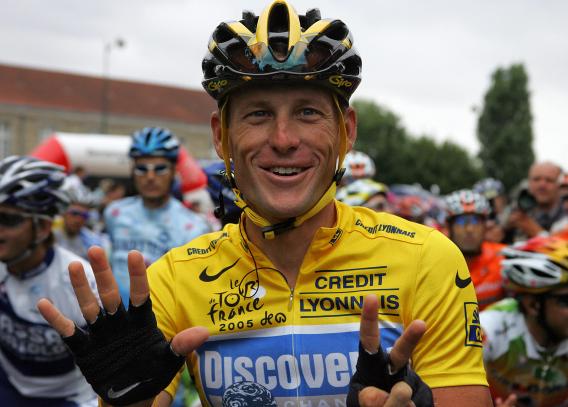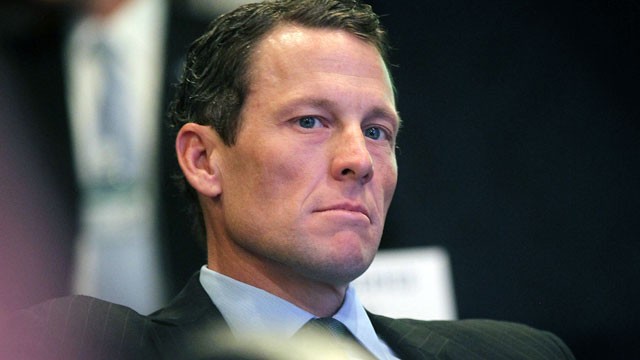It's now official - Lance Armstrong has been stripped of all of his cycling results from August 1st 1998 forward, including the record seven Tours de France that he had won. He is also permanently banned from cycling and any World Anti-Doping Agency sanctioned events, including his new hobby of triathlons.
I have some thoughts about all of this that may counter to a lot of what is in the press and posted online. First, however, here is the case against Armstrong as revealed so far, with a lot of links so you can read the material yourself and form your own opinion - after that, I will explain my perspective.
“The UCI will not appeal to the court of Arbitration for Sport, and it will recognise USADA’s sanction against Lance Armstrong,” said UCI President Pat McQuaid, who spoke forcefully about the fight against doping. “The UCI will ban Lance Armstrong from cycling and the UCI will strip him of his seven Tour de France titles. Lance Armstrong has no place in cycling.”
McQuaid said that it will also recognised the USADA’s sanctions on the riders who testified, and thanked them to for that. He said that the UCI will set up a structure to examine the doping situation which had happened, and will take measures to safeguard the sport from experiencing the same sort of problems as before.
On August 23rd, Armstrong was handed a lifetime ban from sport by USADA plus had all of his results since August 1998 taken away. The sanction was handed down after he decided not to fight the doping charges made against him by the agency.
The reasoned decision included over one thousand pages of evidence, including sworn testimony from 26 individuals. Of that number, eleven were former team-mates of Armstrong, namely Frankie Andreu, Michael Barry, Tom Danielson, Tyler Hamilton, George Hincapie, Floyd Landis, Levi Leiphimer, Stephen Swart, Christian Vande Velde, Jonathan Vaughters and David Zabriskie.
Other details contained included what USADA described as ‘direct documentary evidence including financial payments, emails, scientific data and laboratory test results that further prove the use, possession and distribution of performance enhancing drugs by Lance Armstrong.’
Its CEO Travis Tygart said that the management of the US Postal Service team ‘ran the most sophisticated, professionalized and successful doping program that sport has ever seen.’
“The USPS Team doping conspiracy was professionally designed to groom and pressure athletes to use dangerous drugs, to evade detection, to ensure its secrecy and ultimately gain an unfair competitive advantage through superior doping practices,” he elaborated. “A program organized by individuals who thought they were above the rules and who still play a major and active role in sport today.”
Last week, many of Armstrong’s sponsors including Trek, Giro and Nike have announced that they were ending their relationship with him. He also resigned as chairman of the Livestrong foundation.
Christian Prudhomme, the director of the Tour de France, has confirmed that he does not want Lance Armstrong’s seven Tour de France victories reassigned after the UCI ratified the USADA verdict to ban the Texan and disqualify him from results going back to August 1998.
Prudhomme also said that he expects Armstrong to pay back his estimated three million dollars he won in the race.
“There won’t be a winner. The formal decision will be taken by the UCI on Friday but for us, it’s very clear; we want to leave the palmares blank,” Prudhomme told the Reuters news agency after hearing Pat McQuaid speaking during his Geneva press conference.
This is from Armstrong in one of his Nike commercials:
This is my body, and I can do whatever I want to it. I can push it. Study it. Tweak it. Listen to it. Everybody wants to know what I'm on. What am I on? I'm on my bike busting my ass six hours a day. What are you on?
* * * * * * *
This quote offers the key, in my opinion, to understanding who Armstrong is and why he did the things he has done. It reflects both his incredible desire to win, by manipulating his body in any way he can, and the fact that he seriously worked his ass off to be the best cyclist in a peloton filled with other cyclists who were using banned substances as well.
I have no problem with Armstrong having used performance enhancing drugs - every other top rider in that era was also using chemical assistance, and as far as I am concerned, all of it should be legal and monitored by doctors to ensure the safety of the riders (or other athletes).
If you have done a 100 mile ride (like the El Tour de Tucson, which is 109 miles for the top riders), you know how grueling that can be and how hard on the body it is, even if you are in shape and adequately trained. Now imagine doing that for 19 out 21 days, including time trials and some of the steepest mountain climbs in the world. You might be tempted to use drugs, too, to get through those three weeks, especially if you wanted to be competitive in cycling's most prestigious event.
Here is where I have a problem, as revealed in the testimony of several former Armstrong teammates:
Christian Vande Velde testified to being pressured to stick to the program given to him by Dr. Michele Ferrari in 2001, one that "involved regular use of EPO and testosterone", he stated.Vande Velde, Zabriske, and other rides have described an atmosphere where they were pressured and coerced to use drugs and banned methods (blood transfusions) - and Armstrong was instrumental in leveling that pressure on his teammates.
But his fears of needles and of being caught meant he was reluctant to follow the program. He was not selected for the 2002 Tour de France and was told by Armstrong, "if I wanted to continue to ride for the Postal Service team I would have to use what Dr. Ferrari had been telling me to use and would have to follow Dr. Ferrari's program to the letter.
"Johan Bruyneel confirmed this a few days later ... and said he expected to see improvement."
Vande Velde left the team in 2003 for the Liberty Seguros team, which he stated "had an organised doping program as well". After moving to CSC in 2005, and in the absence of "the pressure of an organised doping program, I decided I would only continue in the sport if I could ride clean." He stated he stopped doping in April, 2006.
Zabriskie describes coming into the sport at the time of the Festina affair in 1998, and testified, "I knew I did not want to use drugs". He was reassured by current USA Cycling president Steve Johnson (then with a performance lab), who said the sport was cleaning up.
By 2000, he caught the attention of Bruyneel with a win in the U23 GP des Nations. He was hired on at $40,000, but refused to participate in "recovery injections". In 2001, he was begging to keep his job, accepting a drop in salary to $15,000 just to stay. In 2002, he began using the injections, because "I came to believe it was just vitamins".
Although he joked about EPO on the team bus earlier, Zabriskie testified that he was reluctant to succumb to its use until finally, when his teammate Barry decided to give in, Zabriskie did as well in 2003.
After leaving US Postal in 2004, Zabriskie moved to CSC, during which time he used doping products growth hormone and testosterone several times, but then in June, 2006 he stated he quit doping for good,
Danielson testified to using EPO and blood transfusions on the Discovery Channel team (after taking a pay cut from $200,000 as a neo-pro with Fassa Bortolo to $125k to join Armstrong's team) in 2005, only beginning to get scared of doping in 2007 when the program shifted to blood doping.
"I began to worry that my blood would be mistaken for someone else's," Danielson testified. "The more I thought about it, the more worried I became.
"I found the whole process to be almost emotionally paralyzing," he said, admitting that he got so paranoid that he began to have panic attacks and was given a sedative on the last night of the 2007 Vuelta a España.
"I continued to experience anxiety attacks and have trouble finishing well in races. As a result, I stopped doping in 2007. He then left to join Vaughters' team "where I knew I would be more comfortable competing clean."
Again, I have no problem with Armstrong choosing to do drugs, as many other riders have done (including Levi Leipheimer and George Hincapie), but when he and Bruyneel pressure and coerce other riders to do the same, then I have a real problem.
The decision to cheat, and even more the decision to risk one's health with performance enhancing drugs, has to be a personal choice and a freely made decision. When you cut a rider's salary from $40K a year to $15K because that rider (Zabriske) does not want to use the drugs, that is wrong on many levels.
And then there is the ferocity with which Armstrong went after anyone who dared to expose his drug use and tactics. He was infamous for suing anyone who spoke out, or intimidating, threatening, and even (in the case of Tyler Hamilton) physically intimidating (assaulted?) those people.
From the New York Daily News:
Doping might sometimes be a victimless crime, but not in the case of Lance Armstrong, whose drug abuse and illicit blood transfusions created a phony empire of wealth, adulation and power that had to be protected at all costs.
The Armstrong myth was so lucrative that suppressing the truth came to require an endless behind-the-scenes campaign to bully and intimidate people into silence. Some of it bordered on gangsterism. Some of it was dressed up in the respectable wardrobe of elite law firms. But mostly it was just hot air - a fact that by 2010 had become clear enough to Floyd Landis that he stepped up and burst the bubble, blowing the whistle on the whole big fraud.
Armstrong is undoubtedly the most talented and exceptional cyclist of his generation - yes, he was doped, but he was doped in a peloton of doped cyclists. He was just better at it than all the others.
It's too bad he resorted to doping and intimidation to make himself the best. He was naturally gifted enough to compete even with athletes using drugs, he just wanted a short-cut to the top. Rather than become more innovative in his training, he sought the chemical cocktail to the front of the peloton.
The greatest loss in all this, however, is for the cancer patients - current and in the future - who no longer have a role model to look up to for inspiration. Further, there is no way this will not impact the ability of the Livestrong Foundation to raise money for cancer research. Armstrong has helped raise more than $500 million over the years since he founded Livestrong, and for this alone he should be an American hero - no single person can claim anything near that in helping to cure a disease. But even this achievement will be tarnished by Armstrong's association with cheating.
He may have cheated death in surviving cancer, but he could cheat pro cycling without eventually falling victim to his own hubris and ego.


No comments:
Post a Comment